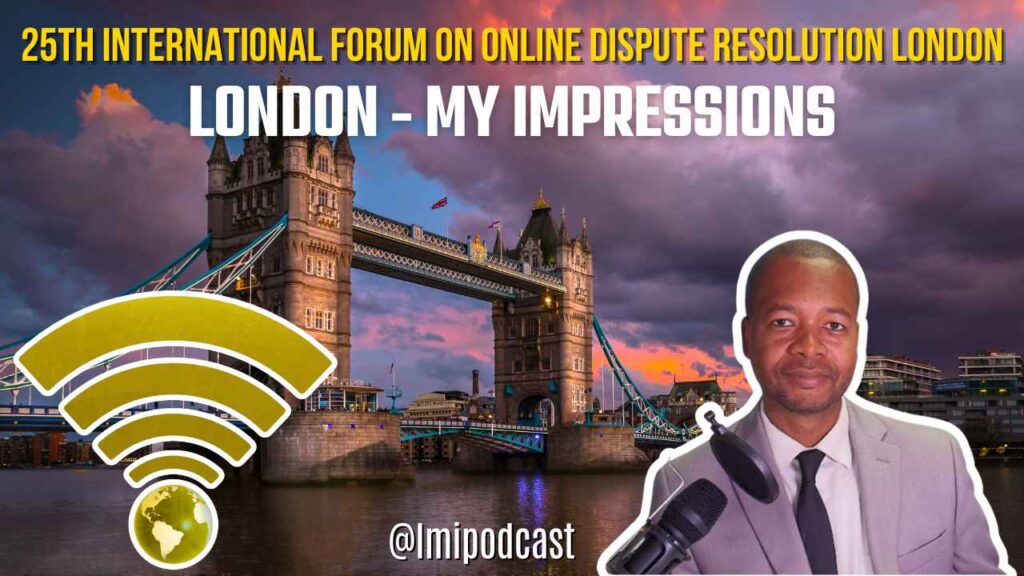Highlights & My Impressions From the 25th International Forum on Online Dispute Resolution in London
As a common practice now when I attend law or mediation conferences, I pack my vlogging gear and take the LMIPodcast on the road. This was no different when attending the 25th International Forum on Online Dispute Resolution (ODR 2025) this week, held at the historic Old Royal Naval College in London. Documenting my educational journey this way helps me focus on key takeaways to implement when I return to my professional work, and also helps spread tidbits of knowledge to those interested but could not make it.
Following my experiences this year at events like the ABA Dispute Resolution Spring Conference in Chicago last month, the ABA TechShow prior to that, and the International Congress for All Mediation held in France before that, I was eager to dive deep into the specific world of ODR, and this milestone 25th gathering of global experts was the perfect place.
The Forum was hosted by the US-based National Center for Technology and Dispute Resolution (NCTDR), directed by Leah Wing, which works in conjunction with the International Council for Online Dispute Resolution (ICODR), an organization I had joined due to its work promoting effective online mediation. With most mediators becoming “online mediators” overnight because of the global pandemic, the use of core standards for what it means to be an effective, ethical, and secure online mediator has now become a necessity. See the ICODR standards. One of the speakers, Attorney & Professor Yoshi Hayakawa of Tokyo, a panelist who discussed the recent adoption of the ICODR standards by the Geneva-based International Organization for Standardization (ISO), stopped by the LMIPodcast to share his thoughts on the developing standards.
Networking
As usual with attending in-person events after Zoom gatherings had become the norm, I get fantastic opportunities to connect with colleagues. It was good to meet with Graham Ross and Ian MacDuff, 2 giants in the dispute resolution field. Ian, the final speaker to close out the conference, runs the ICODR Podcast, which covers the growing field of ODR (listen here). It was also cool to shake hands with Professor Richard Susskind, a legal futurist who I have followed since law school and who discussed points from his new book, How to Think About AI, when giving the opening keynote address for the Forum.
The Venue
The conference venue, London’s Old Royal Naval College in Greenwich, was probably one of the most beautiful and historically rich places to have hosted a law or mediation conference. Kudos to the planners who decided on this site. Because the venue was located on the River Thames near the Prime Meridian and the Cutty Sark ship museum was nearby, it was unnecessary to travel far for tourist sites. I’ll note though that a 3-hour walk from the college gets you to Buckingham Palace, a walk that was quite adventurous.
Demos & Students
One unique thing about this conference was the opportunity to check out tech demonstrations of new technologies coming to market, or that are being expanded. I’m keen to see the development of ODR Labs in June, which was presented by Suman Kalani as a kind of ODR incubator to help get ODR ideas off the ground.
There were a lot of students at this event. Many were presenters. It was good to see that so many young people are taking ODR very seriously because after all, they are the future developers and customers of ODR.
Dynamism in Legal Tech & ODR
One of my biggest takeaway from the Forum overall was the accelerating pace of innovation and implementation in ODR globally. Listening to Morenike Obi-Farinde‘s presentations on how quickly ODR is growing in various African countries was inspiring. Expanding access to justice via online platforms being developed outside of the West underscores how central court and mediation technology has become to the evolution of dispute resolution for all peoples.
By the time Christina Blacklaws of LawtechUK spoke on Day 2 and described Legal Geek and its upcoming law tech conferences in North America, I felt a bit left behind that all this energy and dynamism has been happening without my participation. One cannot help but realize by the end of the Forum that some big things are happening here that are going to change the fields of law and conflict resolution forever. I’m extremely glad I went to this Forum.
Final Thoughts
For those who waited until the very end of the Forum, it was announced that 2026’s event will be held in Boston, Massachusetts.
All in all, the 25th ODR Forum was an exceptionally valuable event. There were some tech hiccups along the way while going through the event, such as the college wi-fi not working for attendees, but it was overall a well-organized event under Graham Ross’s leadership. It masterfully combined cutting-edge technological insights in the field of ODR and contained critical discussions on ethics, security, and the future of AI. I left London with fresh perspectives, strengthened professional relationships, and a renewed sense of excitement about the future of online dispute resolution in my states of Texas and Florida, and around the world.
If you attended ODR 2025, or have been following the developments discussed, I’d love to hear your thoughts!





